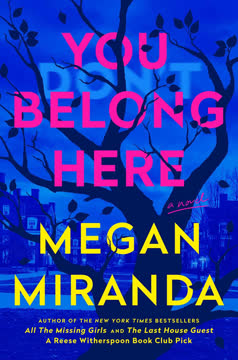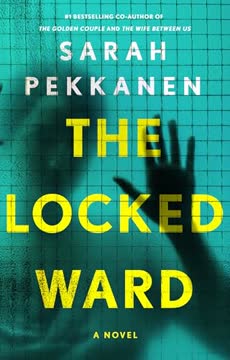Plot Summary
Prologue: Shadows of the Past
The novel opens with Beckett Bowery reflecting on how quickly stories can shift, and how the past never truly lets go. Twenty years ago, a college tradition at Wyatt spiraled into tragedy: two men died in the steam tunnels, a fire raged, and Beckett's roommate Adalyn Vale vanished, becoming the prime suspect. Beckett, once Adalyn's closest friend, was left behind to face suspicion and the town's long memory. The emotional residue of that night—confusion, denial, anger, and fear—still haunts Beckett, especially as she prepares to return to the place she fled, this time as a mother.
Return to Wyatt Valley
Beckett drives her daughter Delilah to Wyatt College for her freshman year, dreading the return to her hometown. The journey is fraught with anxiety, regret, and a sense of inevitability. Beckett's parents still live in Wyatt Valley, and Delilah's decision to attend the college—despite Beckett's efforts to keep her away—forces Beckett to confront the ghosts she's tried to bury. The town is unchanged, but Beckett's memories are sharp: the fire, the deaths, and Adalyn's disappearance. The past feels dangerously close, and Beckett's fear for her daughter's safety grows.
Unspoken Wounds
At her parents' house, Beckett is surrounded by reminders of her youth and the unresolved trauma of the past. Delilah is eager and independent, but Beckett is haunted by what she hasn't told her daughter. The burned-down house on the street is a physical echo of the old tragedy. Beckett's parents are preparing to leave for a semester abroad, leaving Beckett feeling unmoored. The family's dynamic is fraught: Beckett's Mother is probing, her father distant, and Delilah is caught between them, unaware of the full weight of her legacy.
Dorm Room Secrets
Delilah moves into her dorm, but Beckett senses something is off. The campus is full of tradition and history, but also secrets—like the sealed steam tunnels and the echoing halls of Beckett Hall, named for Beckett herself. Delilah's roommate situation is tense, and the building's maintenance man, Lenny, offers cryptic warnings about safety. Beckett's anxiety intensifies as she realizes how little control she has over her daughter's new life, and how the past might be repeating itself in subtle, dangerous ways.
The Howling Tradition
The "howling" is a campus tradition: a nighttime chase through the woods, seniors in masks, freshmen running for safety. It's a rite of passage, but also a source of fear and legend. Beckett recalls her own experiences—how the game was both thrilling and perilous, and how the boundaries between play and real threat were always thin. The tradition is a metaphor for the way the past haunts the present, and how easily innocence can turn to tragedy. The howling's legacy is still alive, even if the school tries to suppress it.
Old Friends, New Fears
Beckett encounters old acquaintances: Violet, now a mother herself; Cliff, her high school ex, now a dean; and Maggie, her childhood friend. Each meeting is tinged with history and unresolved tension. Violet's son Bryce is a student, and his presence is unsettling. Cliff's transformation from local troublemaker to administrator is jarring. These reunions force Beckett to confront the ways everyone has changed—or hasn't—and to question who can be trusted. The town's divisions between locals and college people remain sharp, and old resentments simmer beneath the surface.
The Fire's Echo
A new fire in the neighborhood echoes the old tragedy, unsettling Beckett. She explores the burned house and finds evidence that someone else is watching—an ember, a lingering match, a sense of being followed. The fire is a symbol of unresolved trauma and the way the past refuses to stay buried. Beckett's fear intensifies as she realizes that the cycle of secrets and danger may be starting again, this time with her daughter at risk.
Lost and Found
When Delilah goes missing after a dropped phone call in the middle of the night, Beckett's worst fears are realized. She races back to Wyatt Valley, retracing Delilah's steps through the woods, the quarry, and the campus. The search is frantic and desperate, echoing Beckett's own search for Adalyn years before. The landscape is full of hidden dangers and memories. Beckett's anxiety is compounded by the town's suspicion and the police's scrutiny. The emotional intensity is raw: the terror of losing a child, the guilt of past mistakes, and the relentless pressure of unresolved history.
The Mask in the Quarry
Beckett finds a red mask in the quarry, evidence that the howling tradition—and its dangers—are alive. The mask is a symbol of anonymity, fear, and the way the past seeps into the present. Beckett's investigation leads her to suspect that someone is targeting Delilah, using the old games as cover for something more sinister. The discovery of the mask, and the realization that Delilah has been hiding out at her grandparents' house, heightens the sense of threat. The lines between victim and perpetrator, past and present, blur.
The Missing Daughter
As Beckett and Delilah's father, Trevor, search for their daughter, they uncover layers of secrets: Delilah's troubles with her roommate, missing belongings, and a request to change dorms. The campus police and local detective Fred Mayhew become involved, and suspicion falls on Delilah. The discovery of threatening messages written on Beckett's childhood bedroom wall suggests someone is stalking Delilah. The emotional stakes are high: Beckett's guilt, Trevor's helplessness, and Delilah's fear and isolation. The search becomes a crucible for the family, forcing them to confront their own failings and the dangers lurking in the community.
The Witness and the Key
The investigation turns to the old steam tunnels and the missing skeleton key—a symbol of access, secrets, and guilt. Beckett discovers the key hidden in her parents' house, linking the present danger to the original crime. The narrative weaves together past and present: Adalyn's disappearance, the deaths in the tunnels, and the current threats to Delilah. The "witness" who has been sending Beckett cryptic messages is revealed to be Violet, who has her own reasons for seeking justice. The key becomes a metaphor for the choices that lock people into cycles of guilt and retribution.
Generational Guilt
The story delves into the ways the previous generation's actions have shaped the lives of their children. Beckett's parents' complicity, Violet's quest for justice for her lost fiancé, and Cliff's divided loyalties all come to bear on the present crisis. Delilah is caught in a web of history she barely understands, and Beckett must reckon with the consequences of her own silence and lies. The emotional core is the desire to protect one's child, even at great personal cost, and the realization that some debts can never be fully paid.
The Body in the Pit
The discovery of a woman's body in the construction pit on campus shocks the community. The victim is identified as Adalyn Vale, returned after twenty years. The circumstances of her death—drowning, moved postmortem—mirror the old tragedy and suggest a deliberate attempt to frame Delilah. The investigation intensifies, with suspicion falling on Beckett and her family. The emotional tension is acute: the fear of wrongful accusation, the pain of old wounds reopened, and the desperate need for truth.
The Circle Tightens
As the police close in, Beckett uncovers the tangled motives of those around her: Violet's vendetta, Bryce's anger, Cliff's secrets, and her own parents' hidden actions. The narrative accelerates as Beckett races to protect Delilah, confront Violet, and piece together the truth of what happened to Adalyn. The sense of inevitability is strong: the past cannot be escaped, and the consequences of old choices are coming due. The emotional arc is one of reckoning, as each character must face what they have done—and what they have failed to do.
Truths Unravel
The climax brings all secrets to light: Violet's role as the witness and avenger, Bryce's misguided quest for justice, Adalyn's attempt to protect Delilah, and Beckett's own guilt in the original tragedy. The confrontation in the tunnels is tense and cathartic, as Beckett confesses her role and Violet's vengeance is thwarted. The police arrive, and the cycle of accusation and silence is finally broken. The emotional release is profound: grief, relief, and the hope of redemption.
The Confession
Beckett is arrested, finally facing the consequences of her actions twenty years ago. She confesses to her role in the deaths, sparing Delilah and her mother from further suspicion. The emotional weight is heavy: Beckett's love for her daughter, her regret for the past, and her acceptance of punishment. The family is left to pick up the pieces, but there is a sense of closure and the possibility of healing. The narrative comes full circle, as Beckett's story is finally told in her own words.
Reckoning and Release
In the epilogue, Beckett reflects on her time served, the meaning of justice, and the possibility of forgiveness. She counts the days until her release, cherishing the visits and letters from Delilah and Trevor. The past cannot be changed, but the future is still open. The novel ends with Beckett's hope of coming home, the promise of reunion, and the enduring power of love and truth.
Characters
Beckett Bowery
Beckett is the emotional and narrative center of the novel—a woman shaped by trauma, guilt, and fierce maternal love. Once a local girl and faculty child at Wyatt College, she fled after her roommate Adalyn's disappearance and the deaths in the tunnels, carrying the weight of suspicion and unresolved grief. As a mother, she is protective to the point of secrecy, desperate to shield Delilah from the dangers of the past. Beckett's psychological arc is one of reckoning: she must confront her own complicity, confess her role, and ultimately sacrifice her freedom to save her daughter. Her relationships—with her parents, Trevor, Delilah, and her old friends—are fraught with unspoken wounds and the longing for forgiveness.
Delilah Bowery
Delilah is Beckett's daughter, independent, bright, and eager to claim her own life. She is drawn to Wyatt College by a sense of mystery and the allure of her mother's hidden past. Delilah's journey is one of awakening: she is targeted by unseen threats, forced to navigate betrayal, and ultimately must confront the reality of her family's history. Her relationship with Beckett is loving but strained by secrets. Delilah's psychological development is marked by the loss of innocence, the forging of resilience, and the painful process of understanding her mother's choices.
Adalyn Vale
Adalyn is both a ghost and a driving force in the narrative. Twenty years ago, she was Beckett's best friend and the prime suspect in the deaths of two men. Her disappearance left a void and a legend. In the present, her return and subsequent death reignite old wounds. Adalyn is complex: privileged, reckless, and ultimately a victim of circumstance and her own choices. Her actions—setting the fire, fleeing, returning—are motivated by desperation, guilt, and a longing for connection. She is both a mirror and a warning for Beckett and Delilah.
Trevor Dayton
Trevor is Delilah's father and Beckett's former partner. He is reliable, calm, and deeply caring, but also kept at a distance from the secrets of Wyatt Valley. Trevor's role is to anchor the family, provide support, and ultimately help Beckett and Delilah navigate the crisis. His psychological arc is one of learning to trust, forgive, and step into a more active role in his daughter's life. Trevor's presence highlights the contrast between the world Beckett left behind and the one she tried to build.
Violet Wharton
Violet is a former local, now married to a wealthy developer, and mother to Bryce. She is revealed as the "witness" who has been sending Beckett threatening messages, driven by the loss of her fiancé Charlie Rivers in the original tragedy. Violet's psychological complexity lies in her need for justice, her manipulation of events, and her willingness to cross moral lines to protect her son and avenge the past. Her confrontation with Beckett is the novel's emotional and ethical crucible.
Bryce Wharton
Bryce is Violet's son, the child of Charlie Rivers, and a student at Wyatt College. He is consumed by the legacy of his father's death and manipulated by Violet's narrative. Bryce's actions—harassing Delilah, stealing keys, and participating in the howling—are driven by anger, confusion, and a desire for belonging. He is both a victim and a perpetrator, caught in the generational cycle of guilt and retribution. His psychological arc is one of exposure, reckoning, and the possibility of redemption.
Cliff Simmons
Cliff is Beckett's high school ex, now a dean at Wyatt College. He is a survivor, having navigated the town's divisions and reinvented himself. Cliff's loyalties are divided: he was friends with the victims, but also with Beckett. He is revealed as the "witness" who saw Beckett and Adalyn the night of the tragedy, and his actions are motivated by guilt, self-preservation, and a desire to finally set things right. Cliff's psychological complexity lies in his ability to adapt, his buried pain, and his ultimate decision to confront the truth.
Fred Mayhew
Fred is the local police detective, present both in the original investigation and the present crisis. He is persistent, skeptical, and deeply invested in the town's history. Fred's role is to pursue the truth, but also to embody the community's suspicion and need for closure. His psychological arc is one of frustration, empathy, and the recognition that justice is never simple.
Beckett's Mother
Beckett's mother is a retired professor, analytical and emotionally reserved. She is both a source of wisdom and a participant in the family's culture of silence. Her decision to help Adalyn escape, and later to pay her off, is motivated by maternal love and guilt. She represents the generational transmission of secrets and the difficulty of true confession.
Maggie
Maggie is Beckett's childhood friend, now a mother herself. She is a touchstone for Beckett, offering support, perspective, and a reminder of what was lost. Maggie's role is to ground the narrative, provide emotional clarity, and help Beckett see the possibility of forgiveness and healing.
Plot Devices
Dual Timelines and Echoes
The novel's structure alternates between the present-day crisis and flashbacks to the original tragedy. This device creates suspense, deepens character motivation, and highlights the cyclical nature of trauma. The repetition of events—the howling, the fire, the missing girl—serves to blur the boundaries between generations and underscore the theme that history repeats when secrets are left to fester.
The Howling and Masks
The howling is a central plot device: a campus tradition that becomes a metaphor for the dangers of groupthink, anonymity, and the thin line between play and violence. Masks symbolize the ways characters hide their true selves, both from others and from themselves. The tradition's persistence, despite official bans, reflects the power of collective memory and the difficulty of breaking harmful cycles.
The Skeleton Key and Tunnels
The missing skeleton key and the steam tunnels are literal and figurative conduits for the novel's mysteries. They represent hidden knowledge, forbidden access, and the ways in which the past is always just beneath the surface. The key's journey—from Beckett to Adalyn to the present—mirrors the transmission of guilt and the search for redemption.
Unreliable Narration and Misdirection
The narrative is shaped by unreliable memories, shifting perspectives, and deliberate misdirection. Characters lie, omit, and reinterpret events, both to protect themselves and others. The reader is kept in suspense, forced to question every account and piece together the truth from fragments. This device heightens tension and reflects the novel's themes of confession, denial, and the impossibility of full understanding.
Generational Inheritance
The plot is driven by the ways in which the previous generation's actions shape the lives of their children. Guilt, trauma, and unresolved conflict are inherited, often unconsciously. The novel explores the psychological burden of legacy, the desire to protect one's child, and the difficulty of breaking free from the past.
Analysis
"You Belong Here" is a masterful exploration of how the past shapes the present, and how secrets—no matter how deeply buried—inevitably surface. Megan Miranda uses the framework of a campus thriller to probe deeper questions of guilt, forgiveness, and the generational transmission of trauma. The novel's dual timelines and mirrored events create a sense of inevitability, as characters are forced to confront the consequences of their choices. The howling tradition, the missing key, and the recurring motif of fire all serve as metaphors for the dangers of silence and the need for confession. At its heart, the book is about the lengths to which parents will go to protect their children, and the cost of that protection when it is built on lies. The emotional arc—from fear and denial to confession and acceptance—is both harrowing and cathartic. Miranda suggests that true belonging is possible only when the truth is faced, and that healing requires both reckoning and release. The novel's final message is one of hope: that even after the worst has happened, love and forgiveness can endure, and the future remains open for those brave enough to claim it.
Last updated:
Review Summary
You Belong Here receives mixed reviews, with an average rating of 3.61 out of 5. Many readers praise Miranda's atmospheric writing and the dark academia setting. The story follows Beckett Bowery as she returns to her college town when her daughter attends the same school where a tragedy occurred years ago. Reviewers appreciate the mother-daughter dynamic and the slow-burning suspense. Some criticize the pacing and character development, while others find the twists and ending satisfying. Overall, it's considered a solid thriller, though not Miranda's best work.














